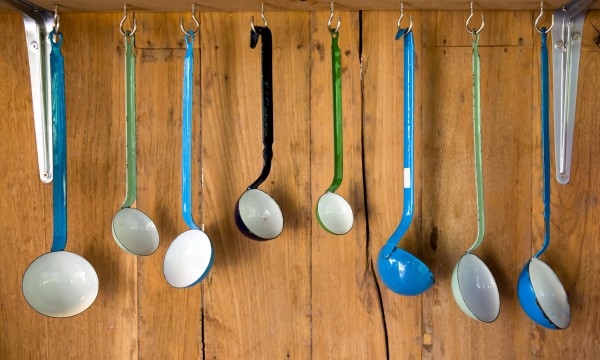You use your kitchen utensils multiple times daily, so it's in your best interest to learn to keep them clean and maintain them for years to come.
- Browse Categories
- All Tips
-
Home & Garden
- All
- Appliances
- Bathroom
- Cleaning
- Crafts
- Decorating
- Electrical
- Flooring
- Furniture
- Garage Door
- Gardening
- Green Living
- Heating
- Home Alarm Systems
- Home Maintenance
- Home Remedies
- Home Security
- Home Staging
- House Sitting
- Junk Removal
- Kitchen
- Lawn Care
- Lock Systems
- Moving
- Outdoor Living
- Pest Control
- Plumbing
- Renovation
- Roofing
- Snow Removal
- Storage
- Tools
- Tree Service
- Health
- Family
- Travel
- Auto
- More Tips
Your account is now active!

Top tips for cleaning kitchen utensils
June 30, 2015

Kitchen utensils
Using the right kitchen tools makes food preparation and cooking easier, faster and even more enjoyable. When you purchase anything for your kitchen, take into account its quality, the material it's made of and how easy it will be to clean.
Modern kitchen utensils can be made of plastic, metal or wood. You can simply drop plastic implements in the dishwasher, but wood and metal implements may require special care. Items that can't go into the dishwasher should be washed with dish soap and water right after use.
Wooden implements
- Don't put wooden spoons in the dishwasher, as heat and cleansers can damage wood. All you need is water and dish soap. Soak heavily-encrusted spoons in a solution of one part baking soda to 10 parts water.
- It is extremely important to thoroughly disinfect wooden cutting boards after cutting poultry, meat and fish to avoid cross-contamination of bacteria. Rub boards with a bleach and water solution, then wash as usual and dry thoroughly.
- Wash wooden handles promptly and allow them to dry. Occasionally massage in some olive or canola oil, and wipe off any excess with a clean cloth or paper towel.
- Prevent grease from adhering to cooking spoons by holding them under cold water just before using them.
- Remove dough stuck to a rolling pin by sprinkling a little salt on it, rubbing it off, then washing and drying thoroughly.
Knives
- Sharpern kitchen knives regularly. If you don't own a knife sharpener, the unglazed bottom of a porcelain teacup works, too.
- Knives cut better if you warm the blade in advance.
- Use only top-quality knives for cutting foods.
- Don't use a ceramic knife to cut frozen foods, bones or hard bread crusts.
- Use either a plastic or wooden cutting board. Glass, metal and stone aren't suitable.
- To protect your knife blades and avoid injuries, keep knives in a knife block, on a magnetic knife strip or in a roll.
- Protect yourself from exceptionally sharp points by capping tips with corks.
- Remove stuck-on residue with a dishwashing brush or a cork dipped in salt.
Metal utensils
- Use a toothbrush to clean hard-to-reach areas in graters and garlic presses.
- Clean metal flour sieves immediately after use in cold water — warm water will make the flour stick like glue.
- If metal gets rusty, sprinkle it with salt and rub with bacon rind.
- Stick metal shish kebab skewers into a cork; they'll stay together, making them less dangerous.
National advertising powered by Mediative.com. Yellow PagesTM, Walking Fingers & DesignTM, YP.caTM, Find. & DesignTM, YellowPages.caTM, Canada411TM and YP ShopwiseTM are trademarks of Yellow Pages Digital & Media Solutions Limited in Canada. All other trademarks are the property of their respective owners. Copyright © 2018 Yellow Pages Digital & Media Solutions Limited. All Rights Reserved.
More Tips
The material on this website is provided for entertainment, informational and educational purposes only and should never act as a substitute to the advice of an applicable professional. Use of this website is subject to our terms of use and privacy policy.







